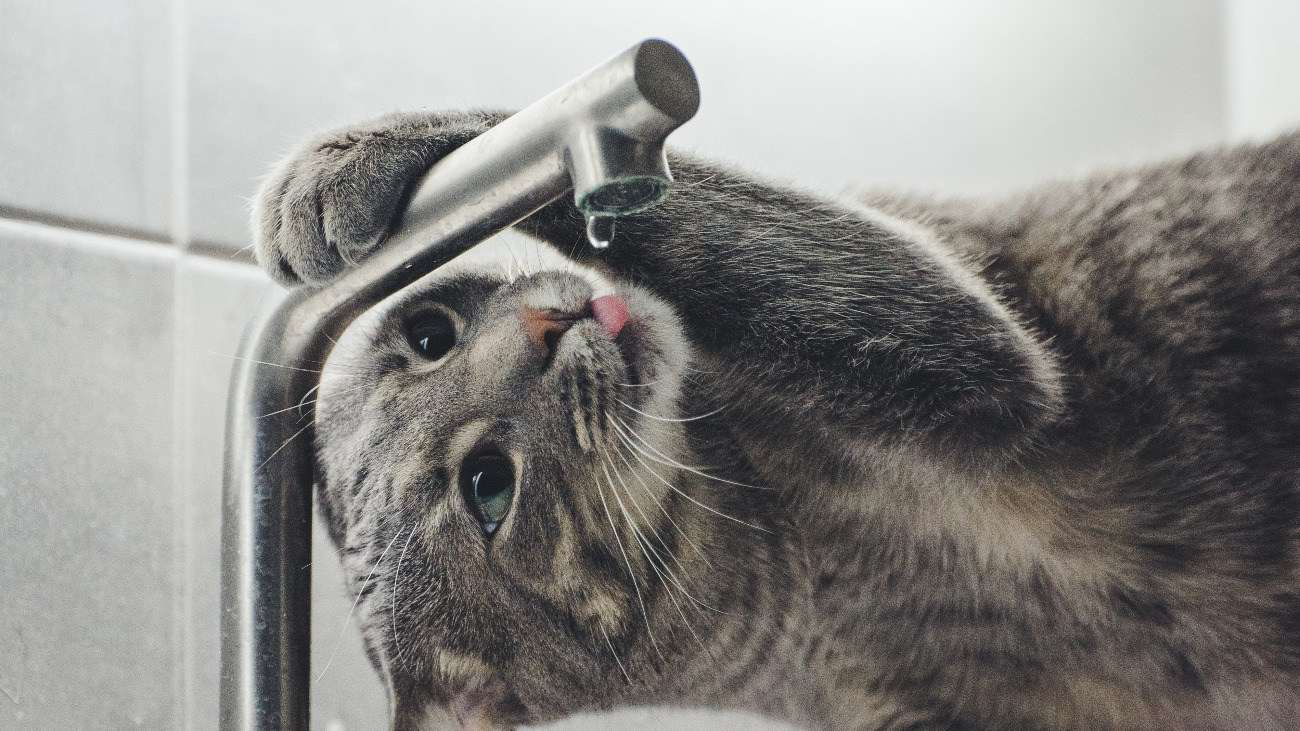Could your cat be dehydrated? It’s surprisingly common.
Cats in the wild would have eaten food that was 70% water content, and rarely drank water at all. Now, we often feed them dry kibble- and they haven’t all caught up to the need to drink water.
In this article, we’ll explore the symptoms of dehydration, and the two main types: chronic, mild dehydration – like the cat who doesn’t drink like they should – and acute, severe dehydration- like the cat that has been vomiting constantly.
What are the causes of dehydration in cats?
Other than getting stuck in the shed for a couple of days or chronically under-drinking, cats can also become dehydrated due to medical conditions.
The most common of these is renal disease. When a cat’s kidneys begin to struggle, they lose the ability to re-absorb water from the kidneys and therefore keep the water in the body. Instead, they produce a lot of urine, and these cats can quickly become dehydrated if they don’t drink enough to keep up with their output.
The same process occurs, for different reasons, in hyperthyroidism and unmanaged diabetes, both of which often cause dehydration in cats. Repeated vomiting or diarrhea will also cause dehydration in those unable to drink water to replace what they’ve lost.
What are the symptoms of dehydration in cats?

Cats that are dehydrated will try to seek out water – you may find them licking the walls of the shower or trying to drink from the toilet. They may also become lethargic and stop grooming themselves.
A quick test for dehydration is to touch their gums (carefully, without getting bitten!) – if they’re at all dry or sticky rather than moist with saliva, your cat is dehydrated and should see a vet. In severe cases, your cat’s eyes will sink into their head and their skin will lose its elasticity.
This means that when you pick up a bit of skin on the back of the neck, it won’t ping back into place. Your cat’s heart rate will also speed up to cope with the lower blood pressure caused by the lack of fluid.
What are the dangers of dehydration?
Dehydration is serious. Whilst mild, chronic dehydration caused by disease can often be solved at home, severe dehydration can result in death.
Mild, chronic dehydration can affect the kidneys as well as other organs. It causes reduced blood flow and so all organs will be at risk. Organs that metabolize drugs, such as kidneys and liver, are particularly at risk if some drugs are used whilst the cat is dehydrated.
More severe dehydration starts to cause heart problems, as the lack of fluid causes the heart to pump faster. This puts the heart under a lot of pressure, and the organs are still unable to get what they need.
At this level of dehydration, the organs will start to die and your cat will be likely to go into a state of shock. Cats at this level are unable to absorb water from their intestines and will die without medical intervention.
How should dehydration in cats be treated?
If you suspect your cat is dehydrated, it’s always best to call your vet for advice. Your vet will probably ask to see your pet – this is for safety, as dehydration can be fatal. They’d rather check your pet over and find it’s mild than tell you to treat at home and find it was more serious than they thought over the phone.
If your cat has a chronic illness and very mild dehydration of 5% or less, your vet may suggest some at-home care. This may involve feeding wet food with extra water added, or providing a rehydration solution for your pet to drink.
Rehydration solutions contain electrolytes to replace those lost in diarrhea or vomiting and are flavored to encourage drinking. You should also encourage these cats to drink more by providing a large choice of water bowls in many different locations, and even cat water fountains. Cat milk may also be an option for persuading these older, ill cats to take in more fluids.
If your cat is only mildly dehydrated, but the symptoms have come on quickly due to vomiting or diarrhea, your vet may suggest treatment at home, but give some medications. This is because a vomiting cat is unlikely to be able to keep water down long enough to absorb it.
Depending on the severity of the vomiting, your vet may recommend your cat has some fluids given at the clinic. This could be under the skin or could be through a needle into their vein.
In severe dehydration cases – for instance, in cases with extreme vomiting, animals that have been locked in a shed for some time, or any animal with a ‘skin tent’ where the skin doesn’t go down quickly at the neck, intravenous fluids are the only way to effectively rehydrate the cat.
It is essential that these cats are not treated at home as their guts will be too compromised to absorb any water they’re given, and they’re usually too much in a state of shock to drink, anyway. It’s important not to rehydrate the cat too quickly, as this puts further pressure on the heart – so your pet will usually have to be hospitalized for 24-48 hours.
These cats need to be carefully monitored to ensure they’re producing urine and may need further testing to identify the cause and severity of the dehydration, as well as monitor their recovery.
Remember: Dehydration can be deadly. Don’t delay- call for advice.
Did you find this article helpful?
